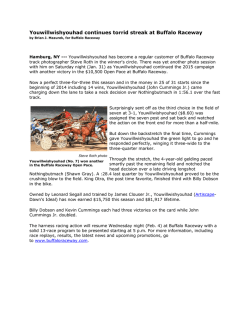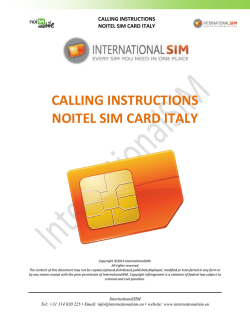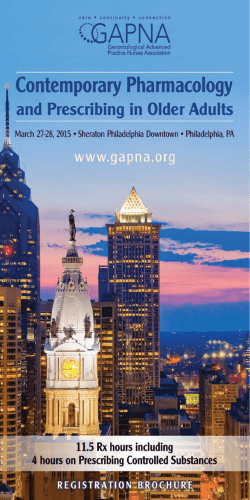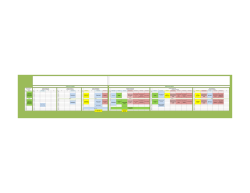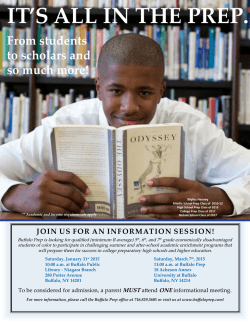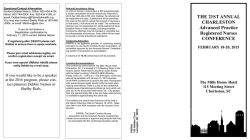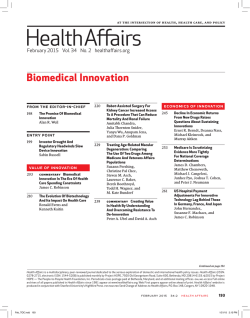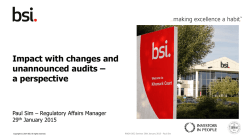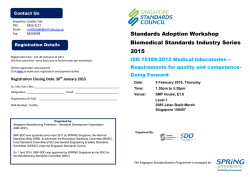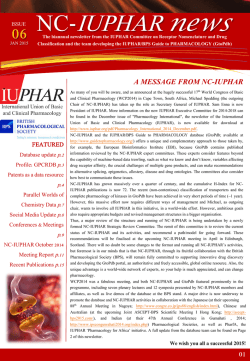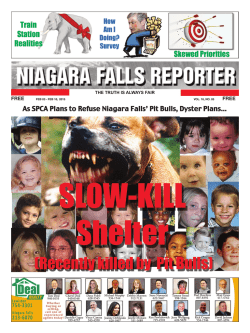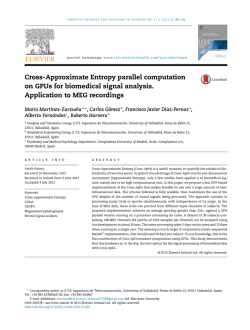
ADAPT Workshop on Biologics
AN ADAPT WORKSHOP UB Center for Protein Therapeutics ON BIOLOGICS Saturday, May 23 – Sunday May 24, Sunday, 24 2015 Niagara Falls, NY WORKSHOP OVERVIEW The ADAPT Workshop Th W kh on Biologics Bi l i is i designed d i d as a companion i t the to th Workshop W kh on Monoclonal M l l Antibody A tib d Pharmacokinetics and Pharmacodynamics, and will illustrate and expand on the modeling methods and approaches used to describe the PK/PD of mAb, as well as other biologics. This Workshop is intended for basic and clinical researchers and drug development scientists who are actively involved with the application of modeling, simulation and data analysis methods to problems involving drug kinetics and drug response. Participants are expected to have experience with PK/PD modeling methods and applications, but not necessarily applied to biologics, and to have participated in the Workshop on mAb PK/PD. Current or past enrollment in the Monoclonal Antibody PK/PD Workshop is a requirement for registration in the ADAPT Workshop on Biologics. Biologics The workshop will include background lectures on mathematical, statistical, and computational aspects of pharmacokinetic/pharmacodynamic modeling, with an emphasis on the principles and applications of simulation and individual estimation methods. Case studies will focus on the application of the ADAPT software to modeling problems involving biologics, and will include hands-on computer work. The case studies will illustrate different PK modeling approaches (e.g., target mediated drug disposition, rapid binding, quasi-steady state, Michaelis Menten, PBPK), as well as applications, and will also demonstrate the application of ADAPT’s simulation, parameter estimation and sample schedule d i tools design l for f understanding d di the h PK/PD / off biologics. bi l i Laptop computers are required i d to participate i i i case studies. in di No special software is needed, and all ADAPT examples will be made available as stand-alone executable programs. This Workshop will give participants an in-depth exposure to modeling approaches and issues relevant to studying biologics, with a comprehensive hands-on exposure to the use of the ADAPT software. ADAPT is made freely available through the Biomedical Simulations Resource at the University of Southern California, which is supported by the Bioengineering Program of the National Institute for Biomedical Imaging and Bioengineering at the NIH (P41-EB001978). COURSE INSTRCUTORS David Z. D'Argenio, PhD is Professor of Biomedical Engineering at the University of Southern California and holder of the Chonette Chair of Biomedical Technology. He is a Fellow of the American Institute for Engineering in Medicine and Biology, American Association of Pharmaceutical Sciences, International Society of Pharmacometrics, a past member of the FDA Advisory Committee for Pharmaceutical Science and Clinical Pharmacology, and a founding member of the International Society of Pharmacometrics. Since 1985 he has served as co-director of the Biomedical and Simulations Resource (BMSR) at USC, which develops, applies and disseminates advanced modeling methods for studying biological systems, where he has also led the development of the ADAPT software for PK/PD modeling and analysis. Joseph P. Balthasar, PhD is Professor of Pharmaceutical Sciences at the University at Buffalo, State University of New York, where he serves as the Director of the Center for Protein Therapeutics. His PK/PD modeling interests and expertise include the development and preclinical evaluation of anti-toxin immunotherapies, the development and preclinical evaluation of anti-cancer immunotherapies (including immunoconjugate immunotherapies), and the development and preclinical evaluation of novel immunotherapies for humoral autoimmune conditions (immune thrombocytopenia, myasthenia gravis). He is a consultant to the NIH and the pharmaceutical industry. Donald E. Mager, g , PharmD,, PhD is an Associate Professor of Pharmaceutical Sciences at the University y at Buffalo,, State University y of New York. He was also a Visiting Professor at the University Paris Descartes (Jan. 2007-2014). He currently serves on the Clinical Pharmacology Advisory Committee to the FDA, and as an Associate or Consulting Editor at CPT:Pharmacometrics & Systems Pharmacology, J. of Pharmacology & Experimental Therapeutics, and Pharmacology, Research & Perspectives. He is a Fellow of the ACCP and is President of the International Society of Pharmacometrics. His research involves identifying molecular and physiological factors that control the pharmacological properties of drugs, with a focus on anti-cancer and immunomodulatory agents. This Workshop is preceded by a 3-day separate course in the concepts and applications of Pharmacokinetic/Pharmacodynamic Modeling coordinated by Dr. William J. Jusko. For information see: http://pharmacy.buffalo.edu/ under Quick Links or contact [email protected]. WORKSHOP SCHEDULE Saturday, May 23, 2015 Sunday, May 24, 2015 8:00 Continental Breakfast 8:00 Continental Breakfast 8:30 Introductions and Overview 8:30 Case Study: Antibody-Antigen Interactions (SIM) 9:00 Background: Modeling with ADAPT 9:15 Case Study: Reduced PBPK Model for mAbs (ID) 10:15 Break 10:30 Break 10:30 Case Study: Target Mediated Drug Disposition (SIM) 10:15 Case Study: PBPK Modeling of IgG (SIM) 11:15 Case Study: Rapid Binding and MM Models (SIM) 11:00 Case Study: PD Model for Anti-Platelet Antibodies (NPD) 12:00 Lunch 12:00 Lunch 1:00 Background: Individual Estimation 1:00 Case Study: Sampling Schedules for TMDD Modeling (SAMPLE) 2:00 Case Study: TMDD Model Estimation (ID/NPD) 1:45 Case Study: PBPK modeling for mAb-ligand interaction (SIM) 3:00 Break 2:30 Break 3:15 Case Study: Modeling Extravascular Absorption PK (ID) 2:45 Case Study: Denosumab PD in Multiple Myeloma (SIM) 4:15 Case Study: Nondepleting Anti-CD4 mAb (SIM) 3:30 Case Study: Anti-IgE/FEV1 Response of Omalizumab (ID) 5:15 Recap, Looking Forward, Adjourn 4:15 Final Q&A and Discussion 4:30 Adjourn REGISTRATION DETAILS Course location: The course will be held at The Conference Center Niagara Falls, 101 Old Falls Street, Niagara Falls, NY 14303. USA. Phone: (716) 278-2100. Fax: (716) 278-0008. The Center is 28 min from Buffalo International Airport. Website: http://www.ccnfny.com R i t ti Registration: O li registration Online i t ti will ill begin b i January J 1 2015. 1, 2015 The Th course is limited to the capacity of 30 participants. Confirmation email of registration will be returned upon successful registration at the following website: http://pharmacy.buffalo.edu/ under Quick Links. Hotel location: Sheraton at the Falls, 300 Third Street, Niagara Falls, NY 14303. USA. Phone: (716) 285-3361. The price is $117/night $117/night. Hotel Deadline: April 13, 13 2015, 2015 website: http://sheratonatthefalls.com Computer Requirements: Laptop computers are required to participate in case studies. No special software is needed, and all ADAPT examples will be made available as stand stand-alone alone executable programs. Workshop Fee: The fee is $600. A US government employee rate of $400 and student rate of $200 is available. The registration fee includes printed and electronic copies of all course materials. Lunches and break-time refreshments during the course are included. Cancellations: Cancellations with a full refund may be made until March 25, 2015. No refunds will be given for cancellations received after this date. Please inform course secretary of any substitutions.
© Copyright 2026
